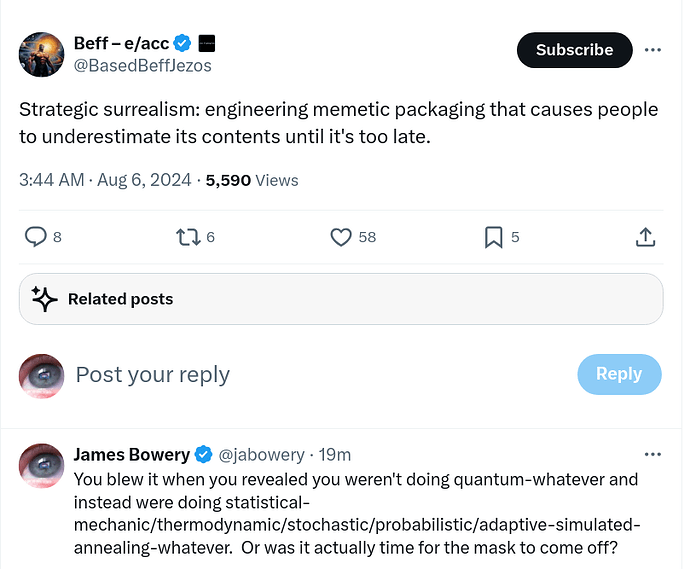I have to admit, Guillaume Verdon had me sandbagged.
I was using Lester Ingber’s Adaptive Simulated Annealing to do orbital launch systems optimization circa 1996 (when Roger Gregory and I were working on our ultracentrifugal rocket engine). That despite having put a lot of investment into hardware accelerated convolutional neural networks in the late 1980s. So I’ve been potentiated to recognize the value of Extropic nearly 30 years and it wasn’t until today that I paid attention to what they were doing because of the “quantum” baggage with which Extropic had been saddled.
Moreover, I probably wouldn’t even have bothered to view the latest progress report…
…were it not for the fact that, in the introduction, my aversion to Jezos’s visage…
…was overcome by his mentioning the University of Waterloo, which I take seriously mainly because of Chris Eliasmith. (Google Brain never impressed me except as hitching its wagon to UW.)
So, ok, you e/acc folks have my belated attention… Here’s my first, hopefully, constructive criticism:
You, like Elon Musk, appear certain that the best strategy for getting the war machine of technological civilization into space (where it belongs – waging war against lifelessness, rather than remaining in the biosphere where it recklessly replaces life) is the centralization of the positive network externalities of technological civilization in your hands. This working hypothesis may or may not be correct. I believe it to be incorrect. The difference between us is that I apparently take your principles more seriously than you in the following sense:
Be ruthless about sociology and apply lossless compression as the most principled information criterion for model selection.
Verdon at least seems vaguely aware of the Algorithmic Information Criterion in this phrase taken from the aforelinked “progress report”:
“the better compression code you learn”
But perhaps being merely “based” falls short of the utter ruthlessness one needs to reform one’s own thinking about sociology.
